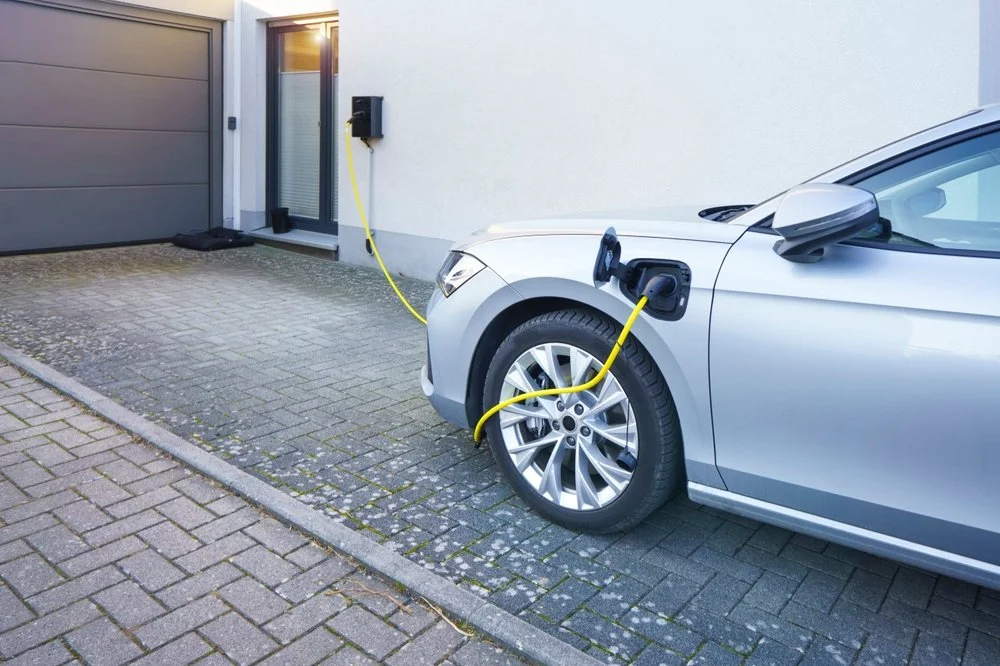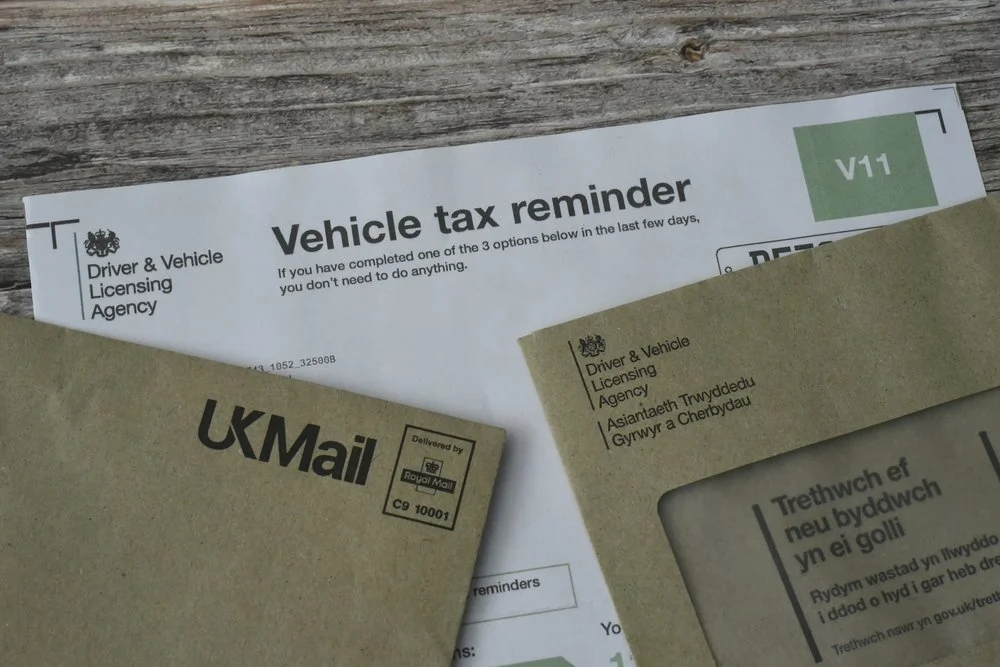Will Income Tax Rise in the 2025 Autumn Budget? How EV Salary Sacrifice Protects You
Source: Shutterstock
What Tax Changes Are Expected in the Autumn Budget 2025?
As we approach the Autumn Budget on 26 November 2025, employees across the UK are naturally wondering what tax changes might affect their finances. As reported by the Telegraph, the Treasury is exploring various options to ensure fiscal sustainability whilst maintaining support for working families.
One proposal gaining attention involves a revenue-neutral shift - potentially reducing National Insurance by 2p whilst increasing income tax by 2p. This approach would help "level the playing field" by treating different income types more consistently, whilst keeping net tax bills unchanged for approximately 30 million working-age employees.
Will the Income Tax Rise Affect My Take-Home Pay?
The good news for working-age employees is that the proposed change would be revenue-neutral for those who pay both income tax and National Insurance. Here's what this means:
If You Pay Both Taxes:
You'd save 2p per pound from lower National Insurance
You'd pay 2p more per pound in income tax
Your net take-home pay would remain the same
Who Would Be Affected: The change would generate revenue from groups who don't currently pay National Insurance, including:
Pensioners (who receive taxable pension income but don't pay NI)
Landlords (whose rental income isn't subject to NI)
Some self-employed individuals with different NI arrangements
This broader tax base would raise approximately £6 billion annually to support public services whilst protecting working people's pay packets.
How Does EV Salary Sacrifice Protect Against Tax Changes?
Regardless of what the Budget brings, electric car salary sacrifice offers employees a smart way to reduce their taxable income base - meaning any tax changes have a smaller impact on their finances.
How Does Salary Sacrifice Reduce Your Tax Bill?
When you salary sacrifice for an electric car, you reduce your gross salary before taxes are calculated. This creates multiple advantages:
Lower taxable base: Less income exposed to any potential tax rate adjustments
Immediate savings: 20-50% off electric cars vs personal leasing
Tax efficiency: Paying from gross salary rather than post-tax income
Budget certainty: Fixed monthly costs with comprehensive cover included
Real Example: £48,000 Earner
Original gross salary: £48,000
Monthly EV salary sacrifice: £400 (£4,800 annually)
New taxable income: £43,200
Result: Tax calculated on smaller base, providing natural protection
Net EV cost after savings: Approximately £260/month
Includes: Insurance, maintenance, breakdown, tyres—all covered
Why Are EV Salary Sacrifice Schemes Protected?
Unlike some benefits facing review, electric car salary sacrifice enjoys robust government backing for clear policy reasons.
What Are the BiK Rates for Electric Cars?
The government has provided long-term certainty by locking in Benefit-in-Kind rates for EVs through 2029:
2025/26: 3%
2026/27: 4%
2027/28: 5%
2028/29: 9%
These rates remain far below the maximum 37% for petrol/diesel vehicles. Industry experts expect continued favorable rates to 2035, providing long-term visibility for financial planning.
Why Does the Government Support EV Salary Sacrifice?
EV salary sacrifice supports several key government priorities:
Accelerates decarbonization: Helps the UK meet Net Zero targets by 2050
Supports jobs: British automotive manufacturing and charging infrastructure
Reduces air pollution: Improves public health outcomes
Maintains fairness: Generates tax revenue through BiK whilst keeping EVs accessible
Increases adoption: Makes Net Zero transport available to working families
The 2030 zero-emission vehicle mandate requires 80% of new car sales to be electric by then—making schemes that accelerate EV adoption a policy priority.
How Much Can I Save With EV Salary Sacrifice?
The savings from electric car salary sacrifice depend on your tax bracket, but most employees save 20-50% compared to personal leasing.
What Does a Basic Rate Taxpayer Save?
Example: £35,000 Salary, £300 Monthly EV
Without Salary Sacrifice:
Pay £300/month from post-tax income
Annual cost: £3,600
Pay separately for insurance, maintenance, breakdown
With Salary Sacrifice:
Gross sacrifice: £300/month
Net cost after tax savings: Approximately £195/month
Annual net cost: £2,340
Savings: £1,260 annually (35%)
Everything included: insurance, maintenance, breakdown, tyres
What Does a Higher Rate Taxpayer Save?
Example: £60,000 Salary, £450 Monthly EV
Without Salary Sacrifice:
Pay £450/month from post-tax income
Annual cost: £5,400
Additional running costs paid separately
With Salary Sacrifice:
Gross sacrifice: £450/month
Net cost after tax savings: Approximately £270/month
Annual net cost: £3,240
Savings: £2,160 annually (40%)
Comprehensive cover included
These savings remain protected regardless of Budget changes because you're paying from gross salary before tax is calculated.
What's Included in EV Salary Sacrifice?
One of the biggest advantages of electric car salary sacrifice is that everything is bundled into your monthly payment—all from pre-tax salary.
What Does Your Monthly Payment Cover?
Through schemes like The Electric Car Scheme, your payment includes:
New electric vehicle
Full maintenance and servicing
Breakdown cover across Europe
Tyre replacement
Road tax
Optional home charger installation
Optional comprehensive insurance
What Additional Savings Are Available?
Beyond the vehicle itself, EV drivers benefit from:
The Charge Scheme: Salary sacrifice EV charging for 20-50% additional savings
Lower running costs: £680 annually vs £1,268 for petrol
ULEZ exemptions: No daily charges in clean air zones
Workplace charging: Many employers offer free or subsidised charging
What Happens at the End of the Lease?
Unlike buying a car, salary sacrifice arrangements eliminate depreciation risk:
No depreciation exposure—simply hand back at end of term
No unexpected repair bills during the lease
No MOT costs during lease period
Option to upgrade to a newer model
Complete Employer Protection if circumstances change
Should I Wait for the Budget or Act Now?
With the Budget approaching on 26 November, you might wonder whether to wait or establish a salary sacrifice arrangement now. Here's what you need to know:
What Are the Advantages of Acting Before the Budget?
Employees who establish electric car salary sacrifice before the Budget benefit from:
Current favorable terms:
3% BiK rate locked in for your entire 2-4 year agreement
Existing arrangements continue under current terms
No surprises if Budget changes other benefits
Immediate protection:
Reduced taxable income providing natural tax protection
Fixed monthly costs with comprehensive cover
Budget certainty regardless of policy changes
Peace of mind:
Secure substantial transport savings today
Access brand-new electric car immediately
Support UK environmental goals whilst saving money
Can My Employer Set Up a Scheme Quickly?
Yes! The Electric Car Scheme offers:
Zero setup costs for employers
Simple implementation with minimal admin burden
Complete Employer Protection from day one
Average NIC savings of £56,000 per participating business
Most employers can establish a scheme within a few weeks, allowing employees to benefit before year-end.
How Do I Get Started With EV Salary Sacrifice?
Getting started with electric car salary sacrifice is straightforward, whether you're an employee or employer.
For Employees: What Are the Steps?
Check eligibility: Ensure your employer offers a scheme (or introduce them to The Electric Car Scheme)
Get a quote: Use the online calculator to see your savings
Choose your vehicle: Select from hundreds of electric cars available
Complete paperwork: Simple salary sacrifice agreement through your employer
Start driving: Delivery typically within 2-4 months (faster for used EVs)
For Employers: How Do I Offer This Benefit?
Book a demo: Learn how the scheme works and benefits your business
Zero cost setup: No fees or ongoing costs for your company
Simple admin: Minimal HR/payroll burden with dedicated support
Start saving: Both you and your employees benefit immediately
The scheme is particularly attractive for employers because:
No financial risk: Complete Employer Protection from day one
NIC savings: Average £56,000 annually per participating business
Employee retention: Valued benefit that improves recruitment and retention
ESG goals: Demonstrates commitment to sustainability
Frequently Asked Questions
Will Salary Sacrifice Affect My Pension?
Your pension contributions are typically based on your base salary before salary sacrifice reductions. However, this depends on your employer's pension scheme rules. Most schemes protect pension contributions, but it's worth confirming with your HR team.
Learn more: Will Electric Car Salary Sacrifice Affect My Pension?
Can I Salary Sacrifice If I'm Close to Minimum Wage?
Your salary after sacrifice must remain above National Minimum Wage thresholds. For most professionals earning £25,000+, this isn't a concern. Your employer's HR team can confirm eligibility based on your specific salary.
What Happens If I Change Jobs?
Most schemes offer flexibility if your circumstances change. Options typically include:
Transferring the arrangement to your new employer (if they participate)
Early termination with Complete Employer Protection
Continuing payments during notice period
Can I Choose Any Electric Car?
The Electric Car Scheme offers access to virtually every electric vehicle on the market, including:
Used electric cars for greater affordability
Is EV Charging Expensive?
No - electric vehicles cost significantly less to run than petrol or diesel. The average petrol driver spends £1,268 annually on fuel compared to just £680 for EV drivers charging predominantly at home.
Additionally, The Charge Scheme allows you to salary sacrifice charging costs, saving an additional 20-50% on all charging—whether at home, work, or public stations.
Learn more: A Beginner's Guide to Charging Your Electric Vehicle
What If I Don't Have a Driveway?
You don't need a driveway to benefit from an electric car. Options include:
Workplace charging: Many employers offer free or subsidised charging
Public charging networks: Over 66,000 public charging points across the UK
On-street charging: Increasingly available in residential areas
Rapid charging: Quick top-ups during weekly shopping or activities
Learn more: How to Charge an Electric Car Without a Driveway
Are Electric Cars Reliable?
Modern electric cars are extremely reliable, with fewer moving parts than petrol or diesel vehicles. This means:
Lower maintenance costs (approximately 50% less than ICE vehicles)
Fewer things that can go wrong
No oil changes, timing belts, or spark plugs to replace
Comprehensive manufacturer warranties (typically 8 years/100,000 miles on batteries)
Learn more: How Reliable Are Electric Cars?
Will Electric Cars Be Cheaper in the Future?
Electric car prices are gradually decreasing as technology improves and production scales up. However, the combination of salary sacrifice savings (20-50% off) and current low BiK rates (3% in 2025/26) means there's never been a better time to switch.
Waiting means missing out on:
Current tax advantages
Immediate transport savings
Years of lower running costs
Protection against future Budget changes
Learn more: Will Electric Cars Be Cheaper in the Future?
Take Action: Protect Your Finances Today
Source: Shutterstock
Rather than worrying about potential Budget changes, take control of your finances now with EV salary sacrifice.
For Employees: Get Your Instant Quote
Calculate your savings now to discover:
✓ Your savings on preferred electric vehicles
✓ Net monthly cost after all tax advantages
✓ How salary sacrifice protects your finances
✓ Which EVs fit your budget and lifestyle
Benefits include:
20-50% savings vs personal leasing
Immediate access to brand-new electric car
Comprehensive insurance and maintenance
Protection through reduced taxable income
Government-backed rates locked until 2029
For Employers: Book Your Demo
Schedule a demo today to learn about:
-Zero setup costs for your business
-Complete Employer Protection from day one
-Why we're Best Salary Sacrifice Provider 2025
The Bottom Line: Budget-Proof Your Transport Costs
As we approach the Autumn Budget, electric car salary sacrifice offers a smart solution that works regardless of tax changes:
-Protected by government policy with BiK rates locked until 2029
-Reduces taxable income providing natural protection against tax adjustments
-Delivers 20-50% savings on electric cars vs personal leasing
-Includes everything from insurance to maintenance in tax-efficient payments
-Future-proof with expectations for continued support to 2035
-Supports Net Zero contributing to the UK's environmental goals
Whatever the Budget brings, you'll be positioned to benefit from government-backed savings whilst driving a brand-new electric car with comprehensive cover - all from pre-tax salary.
Are you an employer?
BOOK A DEMOAre you an employee?
SEE AVAILABLE CARSYou might also like…
The information provided on this blog is for general informational purposes only and should not be construed as tax advice or accountancy services. We are not qualified accountants or tax advisors, and nothing on this site should be relied upon as professional advice tailored to your specific circumstances. Tax laws and regulations are complex and subject to change, and individual situations vary considerably. For specific guidance regarding your tax obligations, financial planning, or accounting matters, we strongly recommend that you consult with a qualified accountant, tax advisor, or other appropriate professional who can assess your particular situation. We accept no liability for any loss or damage arising from reliance on the content provided on this blog.
Last updated: 03/11/2025
Our pricing is based on data collected from The Electric Car Scheme quote tool. All final pricing is inclusive of VAT. All prices above are based on the following lease terms; 10,000 miles pa, 36 months, and are inclusive of Maintenance and Breakdown Cover. The Electric Car Scheme’s terms and conditions apply. All deals are subject to credit approval and availability. All deals are subject to excess mileage and damage charges. Prices are calculated based on the following tax saving assumptions; England & Wales, 40% tax rate. The above prices were calculated using a flat payment profile. The Electric Car Scheme Limited provides services for the administration of your salary sacrifice employee benefits. The Electric Car Scheme Holdings Limited is a member of the BVRLA (10608), is authorised and regulated by the FCA under FRN 968270, is an Appointed Representative of Marshall Management Services Ltd under FRN 667174, and is a credit broker and not a lender or insurance provider.
Copyright and Image Usage: All images used on this website are either licensed for commercial use or used with express permission from the copyright holders, in compliance with UK and EU copyright law. We are committed to respecting intellectual property rights and maintaining full compliance with applicable regulations. If you have any questions or concerns regarding image usage or copyright matters, please contact us at marketing@electriccarscheme.com and we will address them promptly.








